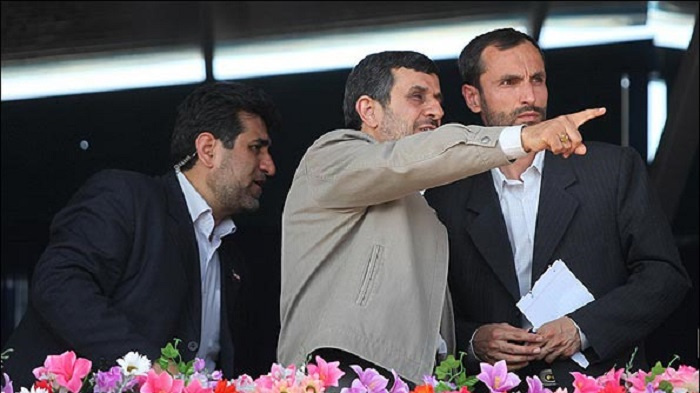Three Members of Ahmadinejad Cabinet Step in for Presidential Elections

(Mahmoud Ahmadinejad and Hamid-Reza Baghaei during a public rally. Source: Mehr)
As Iran’s presidential Election Day approaches, the list of aspirants to the presidential office in Pasteur Street, central Tehran, gets longer.
While among the Reformist camp and political moderates there is a strong consensus over endorsing Hassan Rouhani for a second term, it is still not clear whom the Principlist camp will groom as their candidate for the post, though this might be a tactic to curb attacks for the moment from the opposite camp against their ultimate candidate.
Speculations have been made in the recent months and names are circulating in the media, yet it was only on Saturday that a handful of figures declared their intention to run for the post.
Asked in mid-September 2016 by the Supreme Leader Ayatollah Khamenei not to run for another presidential election, former president Mahmoud Ahmadinejad released a letter ten days ago, announcing, with an undertone of resentment, that he would not support any individual or political group for the upcoming poll. “This is my definite, unalterable stance” he said in his letter. “It may be that some individuals or parties spread rumors about my support for a certain figure in order to serve their collective interests, but hereby I explicitly announce that such news are false and strongly denied, even if stated by my kith and kin.”
However, three members of his administration announced their intention to run for the presidential election slated for early May 2017, on Saturday and Monday: Hamid-Reza Baghaei, Hamid-Reza Haji-Babaei, and Rostam Ghassemi, all of which served in Ahmadinejad’s second administration.
Baghaei, who announced his candidacy on Saturday in his personal Telegram™ channel as an ‘independent’ candidate, was a member of Ahmadinejad’s inner circle, including the enigmatic, controversial Esfandiar Rahim Mashaei, who came under strongest attacks not by the Reformists, but Principlists doubtful about their political plans and good will.
In Ahmadinejad’s second term as president, Baghaei initially served as head of the Cultural Heritage, Handicrafts and Tourism Organization of Iran. Two years later, in 2011, was appointed as Ahmadinejad’s deputy in executive affairs. He also held the portfolio of secretary of the Supreme Council of Iran’s Free Trade, Industrial, and Special Economic Zones. In all his positions, he came under close scrutiny of Reformists and Principlists, for his dubious managerial conduct in both economic and political dimensions. In summer of 2016, he was detained by the judiciary and spent 7 months in prison. His charges were never announced clearly, though speculations addressed financial corruption.
The two other nominees, Hamid-Reza Haji-Babaei and Rostam Ghasemi, did not personally announce their decision, but were introduced by the Yekta Front as their favorite candidates. Yekta is a political group formed by a number of key members of Ahmadinejad’s first and second administration who, unlike Mahmoud Ahmadinejad, enjoy strong ties with the Principlist camp.
Haji-Babaei, a veteran MP and currently a representative from Hamedan constituency, served as Minister of Education in Mahmoud Ahmadinejad’s second cabinet, setting a record for gaining the highest number of confidence votes for the portfolio. He is also a founding member of the Popular Front of Revolutionary Forces (PFRF), another recently-established group of Principlist figures who aim to forge consensus inside the camp to push Rouhani out of the Pasteur Office in 2017 elections.
This is not the first time Haji-Babaei warms up for the presidential election. He had similar goals in 2013, though had a change of mind later, in his own words due to the high number of Principlist candidates. However, in a recent gathering launched to lay out the goals and strategies of the group, Haji-Babaei asserted that the core strategy of PFRF was to secure 51 percent of votes in the upcoming presidential election. During the late 1990s, when the line-up of Iran’s politics was Reformists vs. moderates and Principlists, Haji-Babaei was a member of Moderate and Development Party whose other members included incumbent president Hassan Rouhani, speaker of the government Mohammad-Bagher Nobakht, and other figures who are now part of Rouhani’s administration. However, he resigned from the party after less than four years sensing its rapprochement with the Reformist camp.
The third candidate, Former IRGC commander Rostam Ghasemi served as Minister of Petroleum in Ahmadinejad’s cabinet during the last two years of his second administration. In his ministerial term, Ghasemi had to take helm of Iran’s critical oil industry in its toughest years, with stringent US-led sanctions imposed on the industry, limiting Iran’s exports to one million barrels a day and depriving the country of its lifeline of revenue and forex reserve. Prior to his position as minister of oil, Ghasemi was serving as head of Khatam-al Anbiya Construction Headquarters, the economic arm of Iran’s Revolutionary Guards and one of the country’s largest contractors active in a diverse range of business lines, including development of massive oil & gas fields in the Persian Gulf.
A few months after Rouhani administration began its term, Ghasemi was appointed by Vice President Eshaq Jahangiri as advisor in Iraqi affairs, assigned with handling economic affairs with Baghdad. He was dismissed by Jahangiri in February 2016, however. Reformist media attributed the decision to Ghasemi’s direct role in obstructing the much-touted Iran Petroleum Contracts, a new lucrative scheme set up by Rouhani administration to encourage international companies bring cash and technology to Iran’s energy industry. The contracts came under severe attack by Principlists for their supposed undermining Iran’s ‘economic independence’, handling rich energy resources to international companies with dubious intentions, and marginalizing domestic companies, whom in absence of foreign rivals, had taken control of exploration and production projects.
IRD/66

